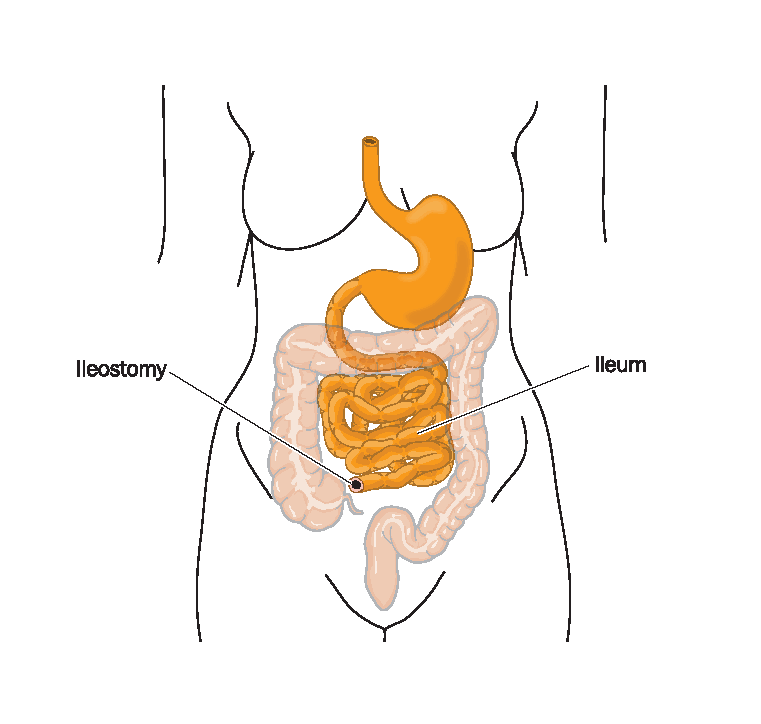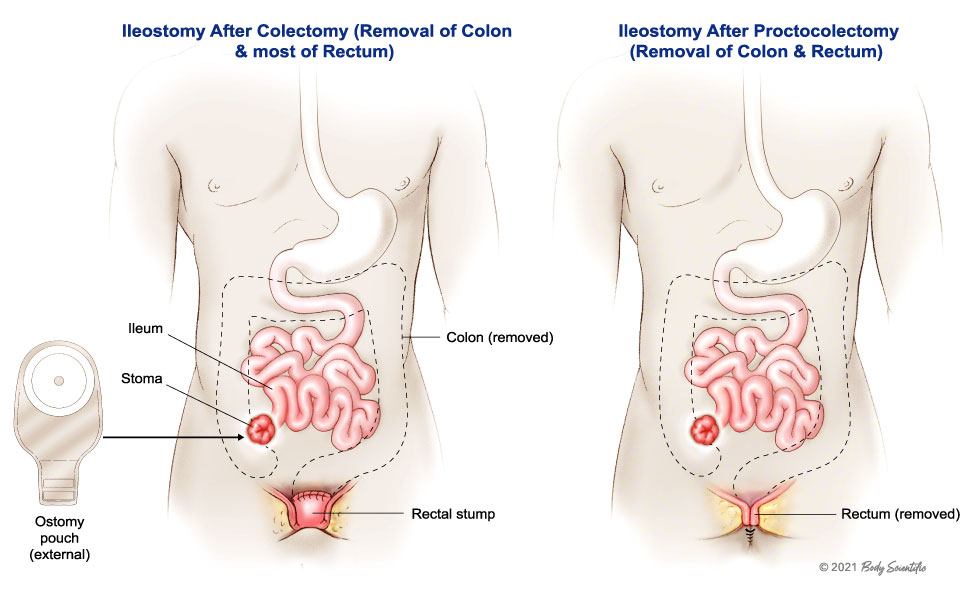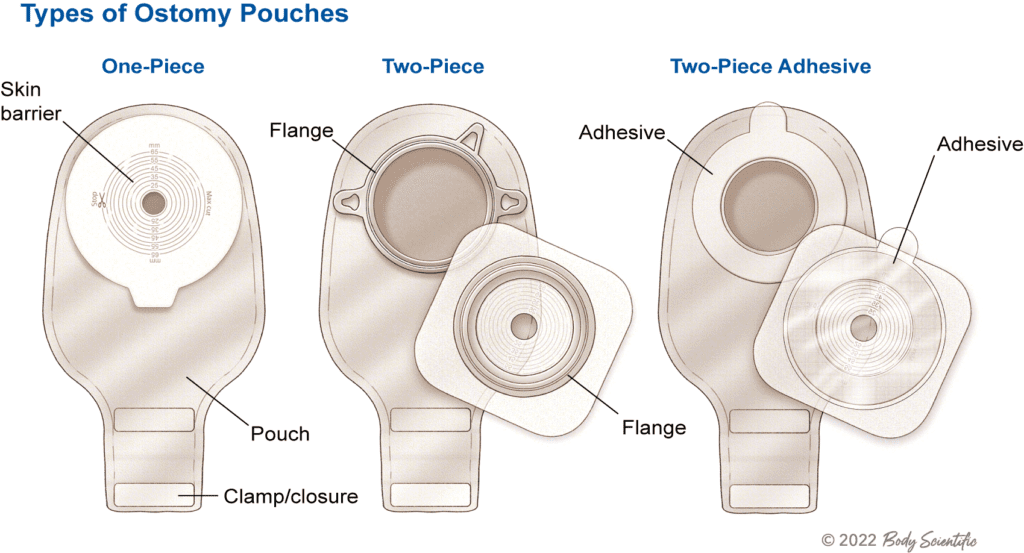 https://www.ostomy.org/wp-content/uploads/2022/12/Christmas-Blog-Post-Graphic.png
1080
1920
Contributor
/wp-content/uploads/2017/02/UOAAlogofinal2.png
Contributor2022-12-15 10:11:082023-12-22 12:53:065 Reasons It’s Awesome to Have an Ostomy During the Holidays
https://www.ostomy.org/wp-content/uploads/2022/12/Christmas-Blog-Post-Graphic.png
1080
1920
Contributor
/wp-content/uploads/2017/02/UOAAlogofinal2.png
Contributor2022-12-15 10:11:082023-12-22 12:53:065 Reasons It’s Awesome to Have an Ostomy During the HolidaysIleostomy: A surgically created opening in the abdomen in which a piece of the ileum (lowest part of the small intestine) is brought outside the abdominal wall to create a stoma through which digested food passes into an external pouching system.
Temporary ileostomy: May be required when a surgical site lower in the digestive tract needs time to heal. Examples include colorectal cancer surgeries, diverticulitis surgery, j-pouch surgery for ulcerative colitis or familial polyposis. A temporary ileostomy is usually constructed with a “loop” stoma.
Permanent ileostomy: May be required when the large intestine is removed and reconnection to the anus isn’t feasible. Possible causes include Crohn’s disease, some cancers, colonic dysmotility, some cases of ulcerative colitis or familial polyposis. A permanent ileostomy is usually constructed with an “end” stoma.

Care of Ileostomy
A pouching system is worn. Pouches are odor free and different manufacturers have disposable or reusable varieties to fit your lifestyle. Ostomy supplies are available at medical supply stores and through the mail and are covered by most health insurance plans.
Resources in Spanish
Living with an Ileostomy
Work: With the possible exception of jobs requiring very heavy lifting, an ileostomy should not interfere with work. People with ileostomies are successful business people, teachers, carpenters, welders, etc.
Sex and Social Life: Physically, the creation of an ileostomy usually does not affect sexual function. If there is a problem, it is almost always related to the removal of the rectum. The ileostomy itself should not interfere with normal sexual activity or pregnancy. It should not prevent one from dating and continuing relationships and friendships. UOAA Affiliated Support Groups are available for emotional support to couples.
Clothing: Depending on stoma location usually one is able to wear similar clothing as before surgery, including swimwear.
Sports and activities: With a securely attached pouch one can swim and participate in practically all types of sports. Caution is advised in heavy body contact sports and a guard or belt can be worn for protection. Travel is not restricted in any way. Bathing and showering may be done with or without the pouch in place.
Diet: For guidance, follow your nurse or doctor’s orders at each stage of your post-op adjustment. Individual sensitivity to certain foods varies greatly. You must determine, by trial, what is best for you. See our guide for special considerations for those with an ileostomy including absorption and blockages. A good practice for all is to chew your food thoroughly and always hydrate properly.
Ostomy Tips and Tricks: Videos and post-operative tips on caring for and adjusting to life with an ostomy and more are available on the Ostomy Tips and Tricks webpage, a Crohn’s & Colitis Foundation partnership with UOAA.
Short Bowel Syndrome (SBS, Short Gut)
Resources available
Physicians and medical professionals are the first sources of help. Specially trained nurses called Wound, Ostomy and Continence Nurses (WOCN) or Ostomy Management Specialists (OMS) are available for consultation in most major medical centers and some community hospitals.
Read Our Latest Posts About Ileostomies:
 https://www.ostomy.org/wp-content/uploads/2022/12/Christmas-Blog-Post-Graphic.png
1080
1920
Contributor
/wp-content/uploads/2017/02/UOAAlogofinal2.png
Contributor2022-12-15 10:11:082023-12-22 12:53:065 Reasons It’s Awesome to Have an Ostomy During the Holidays
https://www.ostomy.org/wp-content/uploads/2022/12/Christmas-Blog-Post-Graphic.png
1080
1920
Contributor
/wp-content/uploads/2017/02/UOAAlogofinal2.png
Contributor2022-12-15 10:11:082023-12-22 12:53:065 Reasons It’s Awesome to Have an Ostomy During the Holidays
Destined to Love, Ostomates by Chance
Colostomy, IBD, Ileostomy, Ostomy 5k, Ostomy Awareness, Patient Stories, Personal, UrostomyOstomy Surgery Saved Matthew Perry’s Life. It’s Time to Stop the Stigmas.
Advocacy, Colostomy, Ileostomy, Ostomy Awareness, Ostomy NewsContact Us

United Ostomy Associations of America
P.O. Box 2293
Biddeford, ME 04005-2293
Call us toll-free at: 1-800-826-0826.
Our Information Line hours are Monday-Friday, 9am to 3pm EST. If you have an emergency, please dial 911 or contact your local medical professional.
Please understand that UOAA is a private, nonprofit, advocacy and informational organization. We are not a medical facility and we do not have medical or legal professionals on staff. Therefore, UOAA does not provide Medical, Mental Health, Insurance or Legal Advice. Visit UOAA Virtual Ostomy Clinic provided by The Wound Company for non-emergency, virtual ostomy support.
Get Involved
UOAA is the leading organization proactively advocating on behalf of the ostomy community. Recognizing that we are always stronger together, we encourage everyone to get involved by joining our Advocacy Network. We’ve also created several Advocacy Tools and Resources to help you successfully advocate on behalf of the ostomy community to ensure every ostomate receives quality care.
Latest News:
 Do you speak stoma?April 4, 2024 - 2:32 pm
Do you speak stoma?April 4, 2024 - 2:32 pm Why Larry David’s “Colostomy Bag” Curb episode is making me speak out about my ostomy after 48 yearsMarch 28, 2024 - 10:43 am
Why Larry David’s “Colostomy Bag” Curb episode is making me speak out about my ostomy after 48 yearsMarch 28, 2024 - 10:43 am Osmani Gonzalez’s StoryMarch 12, 2024 - 12:20 pm
Osmani Gonzalez’s StoryMarch 12, 2024 - 12:20 pm Ostomy Advocates Taking Action in Washington, DC for Digestive DiseasesMarch 8, 2024 - 4:14 pm
Ostomy Advocates Taking Action in Washington, DC for Digestive DiseasesMarch 8, 2024 - 4:14 pm Sexual well-being and intimacy after ostomy surgeryFebruary 22, 2024 - 4:02 pm
Sexual well-being and intimacy after ostomy surgeryFebruary 22, 2024 - 4:02 pm

UOAA does not and shall not discriminate on the basis of race, color, religion (creed), gender, gender expression, age, national origin (ancestry), disability, marital status, sexual orientation, or military status, in any of its activities or operations.


